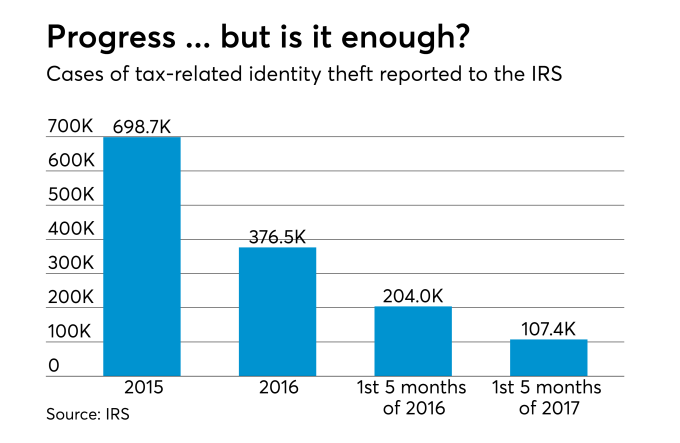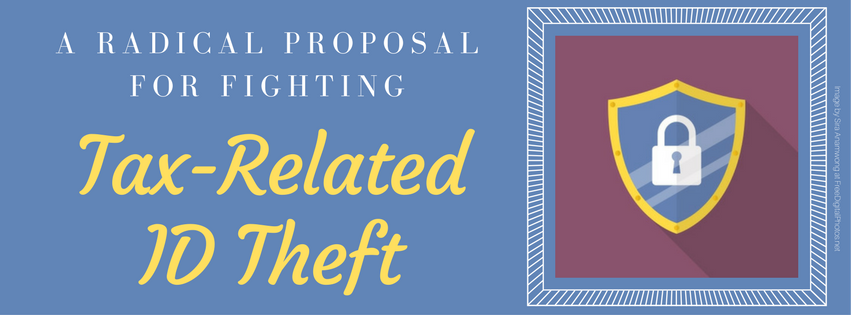Are you concerned about your tax information being stolen? A recent article from TaxProToday.com, written by Roger Russell, brought to our attention how a new idea could help cut down on tax-related ID theft and protect taxpayers in the long run.
Tax experts Roger Harris and Jeff Trinca have an idea to drastically cut down tax refund fraud — by making stolen taxpayer information worthless to thieves. The two talked to staffers on the Senate Finance Committee and the House Ways and Means Committee about the idea last week, and intend to speak with committee members when they return from the August recess next month.
The IRS is making progress in fighting identity theft tax refund fraud, according to Harris, president of Padgett Business Services, and Trinca, vice president of Van Scoyoc Associates. They cite the decline in taxpayers reporting ID theft from 698,700 in 2015 to 376,500 in 2016, a 46 percent drop. And indications are that the number will decline further in 2017.
Yet the lower number still reflects approximately a billion dollars a year in lost revenue. Fraudsters are relentless, and will likely adjust in future filing seasons.
“Rapid refunds and refundable credits are part of the problem,” said Harris. They increase the incentive for ID theft by putting all taxpayers at risk with a system that only benefits a portion of the taxpayer population. Thieves don’t care if a taxpayer is due a refund or owes money; they just want the taxpayer’s information.”
The solution, according to Harris, is a “Refund Lock.”
“There is a large pool of returns that, due to the taxpayer’s expected filing outcome, could be removed as a desirable target for fraud,” he said. “These are returns of taxpayers who have little or no interest in receiving a rapid refund.”

Policymakers at the IRS and Congress could leverage this collective group of tax filers who are disinterested in receiving a rapid refund by allowing them to “lock” themselves out of receiving a potential refund. The tool to do this would be the individual taxpayer accounts, still in the pilot stage, envisioned by the IRS Future State plan.
“The individual accounts would include an application that would allow taxpayers to permanently apply any refund they might receive toward the following year’s estimated tax payment, until they expressly unlock the refund. This would render their information useless to fraudsters,” Harris said. “Directing the refund to estimated taxes avoids the government expense of paying interest on the refund.”
Harris suggested that the IRS initially begin Refund Lock as a pilot program, and market it to balance-due taxpayers. “As the program proves its viability, the IRS could then market it to all taxpayers,” he said. “Taxpayers needing a rapid refund who are willing to add the safeguard of requiring an additional step before receiving it, could activate the application. Once the IRS collects enough data on a Refund Lock application and makes necessary adjustments, Congress could at some future date consider requiring some form of the program be made mandatory for all or some portion of taxpayers filing a Form 1040.”
Tax return preparers would also receive some protections from the program, Harris indicated. “Tax return preparers have increasingly become the target of ID thieves interested in stealing their clients’ data,” he said. “To diminish the value in seeking out tax data in this manner, client data in the preparer’s software could include an upfront warning indicating that the taxpayer in question has opted for Refund Lock. This would place the tax preparer in a unique position to encourage participation, and assist clients with turning on the Refund Lock.”
Currently, thieves have more data than they can sell, according to Harris: “There’s information that was stolen three years ago that is still in their inventory and hasn’t been sold yet. Locking the account with Refund Lock would devalue the entire inventory of stolen IDs.”
In their visit to Capitol Hill, Harris and Trinca didn’t find anyone who didn’t like the idea. “For Congress to be interested, it needs to generate revenue,” Harris said. “It’s uncertain how this might be scored, but if it were scored as a revenue raiser it would help with tax reform.”
The Refund Lock certainly is an interesting idea. Not only would the Refund Lock work to decrease the amount of tax fraud, but tax return preparers would also have an increase in protection from being the target of theft. Do you think the Refund Lock would benefit taxpayers and prevent tax refund fraud? Let us know what your opinion is on the Refund Lock and comment below!
Roger Russell is not only an experienced tax attorney, but a legal and accounting journalist, who enjoys writing on a variety of legal, tax, and accounting issues. He has co-authored and written articles in tax journals and newsletters. He currently is a senior editor on taxes with Accounting Today.
